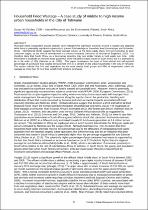 ResearchSpace
ResearchSpace
Household food wastage – a case study of middle to high income urban households in the City of Tshwane
JavaScript is disabled for your browser. Some features of this site may not work without it.
- ResearchSpace
- →
- Research Publications/Outputs
- →
- Conference Publications
- →
- View Item
| dc.contributor.author |
Oelofse, Suzanna HH

|
|
| dc.contributor.author |
Marx Pienaar, N

|
|
| dc.date.accessioned | 2017-02-23T10:02:50Z | |
| dc.date.available | 2017-02-23T10:02:50Z | |
| dc.date.issued | 2016-10 | |
| dc.identifier.citation | Oelofse, S.H.H. and Marx Pienaar, N. 2016. Household food wastage – a case study of middle to high income urban households in the City of Tshwane. In: Proceedings of the 23rd WasteCon Conference, 17-21 October 2016, Emperors Palace, Johannesburg, South Africa | en_US |
| dc.identifier.uri | http://hdl.handle.net/10204/8969 | |
| dc.description | Proceedings of the 23rd WasteCon Conference, 17-21 October 2016, Emperors Palace, Johannesburg, South Africa | en_US |
| dc.description.abstract | Municipal waste composition studies globally have indicated that significant amounts of food is wasted and disposed while there is potentially significant opportunity to prevent food wastage at household level (Lebersorger and Schneider, 2011). International trends suggest that food wastage moves up the food supply chain, from pre-consumer to post-consumer stages, as the level of development in a country increases (Institution of Mechanical Engineers, 2013). It is therefore likely that South Africa, as a developing economy may see similar trends in food waste over time. Little information is available on the food waste proportion of the household waste stream in South Africa, but it is estimated to be in the order of 15% (Nahman et al., 2012). This paper investigates the types of food wasted and self-reported percentage of purchased food wasted at household level in a sample of 301 urban households in the City of Tshwane. The results indicate that fruit and vegetables are the most wasted food groups and 53% of respondents rated this wastage as more than 20 % of their weekly fresh produce purchases. | en_US |
| dc.language.iso | en | en_US |
| dc.relation.ispartofseries | Wokflow;17840 | |
| dc.subject | Household food wastages | en_US |
| dc.subject | Municipal waste composition studies | en_US |
| dc.subject | City of Tshwane urban households | en_US |
| dc.title | Household food wastage – a case study of middle to high income urban households in the City of Tshwane | en_US |
| dc.type | Conference Presentation | en_US |
| dc.identifier.apacitation | Oelofse, S. H., & Marx Pienaar, N. (2016). Household food wastage – a case study of middle to high income urban households in the City of Tshwane. http://hdl.handle.net/10204/8969 | en_ZA |
| dc.identifier.chicagocitation | Oelofse, Suzanna HH, and N Marx Pienaar. "Household food wastage – a case study of middle to high income urban households in the City of Tshwane." (2016): http://hdl.handle.net/10204/8969 | en_ZA |
| dc.identifier.vancouvercitation | Oelofse SH, Marx Pienaar N, Household food wastage – a case study of middle to high income urban households in the City of Tshwane; 2016. http://hdl.handle.net/10204/8969 . | en_ZA |
| dc.identifier.ris | TY - Conference Presentation AU - Oelofse, Suzanna HH AU - Marx Pienaar, N AB - Municipal waste composition studies globally have indicated that significant amounts of food is wasted and disposed while there is potentially significant opportunity to prevent food wastage at household level (Lebersorger and Schneider, 2011). International trends suggest that food wastage moves up the food supply chain, from pre-consumer to post-consumer stages, as the level of development in a country increases (Institution of Mechanical Engineers, 2013). It is therefore likely that South Africa, as a developing economy may see similar trends in food waste over time. Little information is available on the food waste proportion of the household waste stream in South Africa, but it is estimated to be in the order of 15% (Nahman et al., 2012). This paper investigates the types of food wasted and self-reported percentage of purchased food wasted at household level in a sample of 301 urban households in the City of Tshwane. The results indicate that fruit and vegetables are the most wasted food groups and 53% of respondents rated this wastage as more than 20 % of their weekly fresh produce purchases. DA - 2016-10 DB - ResearchSpace DP - CSIR KW - Household food wastages KW - Municipal waste composition studies KW - City of Tshwane urban households LK - https://researchspace.csir.co.za PY - 2016 T1 - Household food wastage – a case study of middle to high income urban households in the City of Tshwane TI - Household food wastage – a case study of middle to high income urban households in the City of Tshwane UR - http://hdl.handle.net/10204/8969 ER - | en_ZA |





